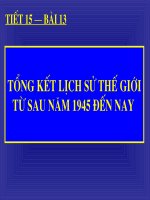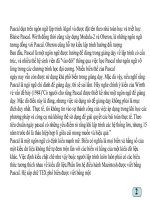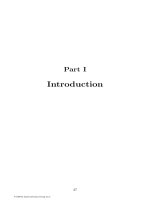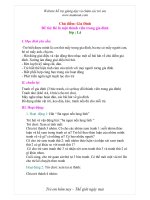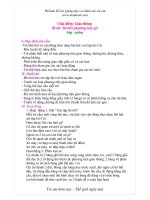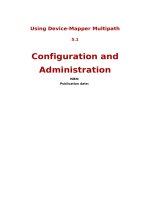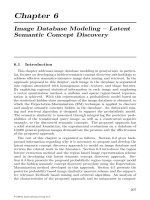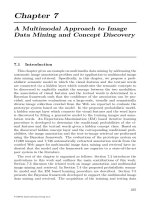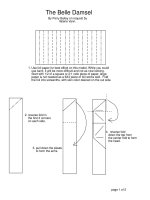Tài liệu SPEECH ppt
Bạn đang xem bản rút gọn của tài liệu. Xem và tải ngay bản đầy đủ của tài liệu tại đây (72.63 KB, 18 trang )
8.3.0 SPEECH
8.3.1 PHILOSOPHY
The Wyoming High School Forensics Association and The Wyoming High School Activities Association believe that speech, as an
activity, offers an unexcelled potential for promoting the democratic ideal. It follows that speech activities programs should be broad enough
to provide adequate areas for maximum student participation. Furthermore, opportunities should be provided for each student to take an
active part at the level of his or her ability to communicate.
An effective speech training program is designed to create a responsible citizen by offering realistic situations requiring judicious listening,
intelligent speaking, and mature patterns of behavior. With proper guidance and motivation, a student, through the many speech activities,
soon begins to develop leadership abilities and express ideas reasonably and persuasively. Through various speech experiences, a student should
become more confident and poised.
By competing with contemporaries in the areas of communication, a student soon learns the value of careful preparation, disciplined
rehearsal, and appreciation for excellence. It is necessary that everyone visualizes speech tournaments and interscholastic meets not as
ends in themselves, but as important teaching devices. They provide the means by which students and teachers can evaluate the strengths
and weaknesses of presentations. By correcting weaknesses and by capitalizing on strengths, students are guided into self-improvement
programs.
8.3.2 GENERAL RULES
A. The Number of Allowable Speech Tournaments
High Schools are allowed ten varsity and three novice meets a year, plus the State Forensic Meet and NFL.
1. This means each individual competitor is allowed to attend ten varsity tournaments.
2. Schools who violate this rule will not be allowed to compete for Sweepstakes at the season's State Tournament and will be reported
to the WHSAA for appropriate actions toward the school. Violations will be ruled upon by the Executive Officers of the WHSFA, with
their decision being final.
B. The Speech Tournament Season
The speech tournament season will run from November 1st through the NFL or State Speech Tournament, whichever is later.
C. Wyoming High School State Forensics Association Membership
Any interested person or school may become a member of the Wyoming High School Forensics Association by paying an annual fee of
$35.00.
D. Voting
Each school in good standing may exercise a vote on matters coming before the WHSFA. Each school has only one vote. Schools must
be members in good standing prior to the State Tournament meeting.
E. Novice Competitor
Any student who has competed in ANY debate event at four tournaments or fewer in the previous season will be considered a novice
debater in Lincoln-Douglas and Public Forum Debate. A novice season, for all students in their first year of Cross-X debate (regardless
of previous experience in any other speech event), will extend throughout that speech season. All coaches and tournament hosts will be
encouraged to follow these guidelines. Coaches who agree to participate actively will have full access to all resources. Participating
coaches will follow the following agreements: disqualifying teams who do not follow the timelines for the parameters for novice cases,
introductions of additional arguments like topicality, counter-plans and critiques. At participating tournaments through the end of February,
a novice division will be offered.
A novice individual events competitor is defined as anyone who has competed in four tournaments or less.
F. Lincoln-Douglas Debate Topics
Each year the Lincoln-Douglas debate topic that will be debated at all Wyoming tournaments for the months of November through
December is listed in the NFL ROSTRUM as the September/October topic. However, the WHSFA may choose a different topic at their
September conference. After December, the topics announced in the ROSTRUM will be debated at all Wyoming tournaments for the
months announced.
G. Cross-Examination Debate Topic
Each year the team debate topic designated by the National Federation and the NFL will be used at all Wyoming tournaments for the
entire season.
H. Public Forum Debate
Each month the public forum debate topic is designated by the NFL as posted on their website and will be used at all Wyoming tournaments
for that month.
8.3.3 STATE TOURNAMENT RULES
A. State Tournament Administration
1. Preliminary Considerations in Advance of the State Tournament
A brochure, containing the State Tournament Schedule and other necessary preliminary data, will be mailed to each school's Forensic
Director five weeks prior to the State Tournament. The individual school's Forensic Director is responsible for complying with the
instructions therein. If the brochure is not received five weeks prior to the State Tournament, the Forensic Director should notify the
WHSAA office and the Tournament Director immediately.
State entry forms must be mailed, complete in all particulars, including accompanying judge information and extemporaneous speaking
questions (if an extemp contestant is entered by a competing school), postmarked by the deadline date, in order for a school to be eligible for
sweepstakes.
2. Eligibility
No entry will be accepted unless signed by the teacher in charge and by the high school principal, who shall attest each student's eligibility.
Each cancellation at registration (not substitution) will cost the infringing school $20.00 for each student dropped and $50.00 in the
case of each debate team (Policy, Public Forum or L-D) entry. This penalty can be avoided by contacting the Tournament Director
prior to registration on Thursday before the tournament begins.
The entry form must be accompanied with the appropriate fee. There will be no refunds for those students who are registered but do not
attend.
3. Fee Schedule
School Registration Fee - $60.00
Each Cross-X Debate Team - 20.00
Each Public Forum Debate Team - 9.00
Each L-D Debate Entry - 9.00
Each Duet Interpretation Team - 9.00
Each Student Congress Entry - 5.00
Each Individual Event Entry Slot - 5.00
4. Entry Limitations
A student is limited to two events at the State Tournament and may not enter two events scheduled at the same time. A high school is limited
to a total of 18 entry slots. Each student entered in any event slot constitutes as an entry, except for cross-examination debate. One cross-
examination debate team counts as two entry slots; whereas, a duet interpretation team counts as one entry slot. A public forum debate team
counts as one entry also. An individual student who is entered in two events counts as two entry slots. Schools may enter their allowable 18
entry slots distributed among the various events as they wish, so long as the maximum number of entry slots per school remains at 18.
5. Awards
Schools shall compete in the same classification as does their basketball team. The Wyoming High School Activities Association will
provide appropriate awards for the winners in each category of competition. The Wyoming High School Forensics Association will be in
charge of the awards ceremony.
Individual Events: 1st place through 6th place medals. All finalists shall be recognized with a medal. (Duet Interpretation: 2 medals
for each team.)
Student Congress: 1st place through 6th place medals.
Lincoln-Douglas Debate: 1st place, 2nd place, and two 3rd place medals.
Cross-X Debate: 1st place, 2nd place, and four 3rd place medals: 2 medals for each team.
Public Forum Debate: 1st place, 2nd place and four 3rd place medals: 2 medals for each team.
Sweepstakes: A sweepstakes trophy, 2nd place and 3rd place trophies will be awarded for the following classes: Class 4A, Class
3A, Class 2A/1A. In the event that Class 1A has eight or more schools entered in the State Tournament, then Class 1A
will be awarded a separate sweepstakes trophy.
Contestant Awards by Class: The top three contestants in each event, in each class, shall receive medals.
These classes shall be 4A,3A,2A/1A.
6. Coding
Contestants must be coded for tournament scheduling purposes. The contestant coding system shall be determined by the Tournament
Director. Name tags are not to be issued to participants.
The Tournament Director will distribute a "school code" sheet to coaches at registration.
Judges will not be coded except to indicate school affiliation.
7. Ballot Verification and School Packets
All participants' ballots shall be placed in the appropriate school's packet and be available for checking during the designated ballot
verification periods:
a. At the end of the preliminary rounds of debate and individual events (according to the tournament schedule)
b. On the last day of the tournament, to review their school packets as needed.
No ballots are to leave the jurisdiction of the tab room. Packets will be available at the conclusion of the Awards Assembly or, if absolutely
necessary, when the school leaves the tournament.
8. Conflict Patterns
A student may not enter two events scheduled at the same time. A student may enter two events scheduled at different times in different
conflict patterns with the exception of Student Congress. No student may double enter in the Student Congress conflict patterns.
The following conflict pattern shall be in operation at the State Tournament:
Pattern (A): Pattern (B):
Cross-Examination Debate Extemporaneous Speaking
Lincoln-Douglas Debate Memorized Humorous Interp.
Public Forum Debate Manuscript Poetry Interp.
Memorized Dramatic Interp. Original Oratory (Memorized)
Memorized Duet Interp. Student Congress
Student Congress
9. Adjudication Procedures
A Tournament Adjudication Committee shall be established which consists of the elected WHSFA officers and the Tournament Director
(hereinafter referred to as the Tournament Committee). The Tournament Committee shall have full power to adjudicate any disputes and to
clarify interpretations of these rules. The Tournament Committee's decision shall be final.
Problems, questions, protests, and points of disagreement must be submitted to the Tournament Director in writing. The Tournament
Director will then arrange a meeting of the Tournament Committee.
Under exceptionally extraordinary circumstances, the Tournament Committee has the authority to modify the rules governing the operation
of the State Tournament. The exercise of such authority shall be communicated to all coaches as soon as possible.
Should a member of the Tournament Committee be unavailable or involved as a party to a protest, the other members of the Tournament
Committee shall appoint a replacement to insure timely consideration of the issue.
In general, protests concerning debate evidence shall follow all general, currently-in-place adjudication procedures. Specifically,
the following procedures shall also apply:
a. Protests shall be filed as soon as the infraction has been noted.
b. The evidence in question shall be examined by the Tournament Committee and proof of authenticity shall be required to be submitted
within two (2) hours. This proof of authenticity shall include: original or photocopies of the evidence and/or complete source citations of
the evidence and/or other additional substantiation as deemed necessary by the Tournament Committee.
c. Once the validity of the protest has been determined by the Tournament Committee, the burden of proof lies with the school whose
evidence has been called into question.
d. The Tournament Committee shall be accorded maximum flexibility in the exercise of their duties.
10. Late Entry to Rounds
The Tournament Director will provide the only valid permission for late entry to rounds.
11. Disqualification
The Tournament Committee has the authority to disqualify a student's continued participation in an event due to a breach of state
tournament rules. Specific infractions are indicated in these rules. As outlined herein, adjudication procedures shall be followed.
12. Tab Room
The tab room shall be closed to all high school personnel except as necessary for the officers of the WHSFA to adjudicate problems
and answer questions and except for those coaches assigned to and serving on the tournament staff.
The executive committee will serve in an oversight role at the State Tournament. They shall be available to handle questions and
general tournament procedures. No person may work in the tab room who is an active high school speech/debate coach or who has
been an active high school speech/debate coach within the past three years.
13. Judges
Judge assignments at the State Tournament are the responsibility of the tournament staff. Except for the strike procedures as stipulated
herein, coaches and students are relieved of any further involvement in the process of assigning judges.
a. From participating schools: Coaches and "Accompanying" Judges
The following commitment shall be required from those schools participating in the State Tournament:
6 or less entry slots:
2 rounds judged personally by the coach.
7-12 entry slots:
Either 2 rounds judged personally by the coach and provide one judge who shall be available for the entire tournament; or 4
rounds judged personally by the coach.
13 + entry slots:
Either 2 rounds judged personally by the coach and provide two judges who shall be available for the entire tournament; or 4
rounds judged personally by the coach and provide one judge who shall be available for the entire tournament; or 6 rounds
judged personally by the coach.
Schools will be obligated for judging no more than the following rounds:
6 or less entry slots: six rounds of judging
7-12 entry slots: twelve rounds of judging
12-18 entry slots: eighteen rounds of judging
No school shall be required to judge rounds in excess of their commitment. Schools may provide for all rounds of judging with
as many judges as wish to provide. They may specify which judge is to cover which part of the obligation. No judge may be
obligated to judge more than eight rounds.
The Commissioner of The WHSAA shall communicate this judging requirement to the Superintendents of Schools and/or
Principalsof all Wyoming high schools in advance of the State Tournament.
The entry form will require coaches to indicate which events they prefer and are competent to judge. Coaches and "accompanying”
judges will not be assigned to judge students from their own schools. Coaches and "accompanying" judges shall receive no personal
compensation for judging.
In the case of schools with co-directors of forensics, one coach must serve "personally" and the other coach must serve as an
"accompanying" judge. The intent of this rule is to prevent co-directors from sharing one judging assignment/obligation.
Each coach should personally judge a minimum of two rounds, regardless of the number of "accompanying" judges provided.
Each coach of a school entered in debate (either Cross-X and/or L-D) will be expected to judge debate (either Cross-X and/or
L-D) or provide an "accompanying" debate judge (either Cross-X and/or L-D).
Accompanying judges may be substituted for a different accompanying judge upon submission of a judge information form.
Former Wyoming high school students who are one year out of high school and who were active participants in competitive speech
activities shall not be permitted to serve as "accompanying" judges.
In Student Congress coaches and "accompanying" judges may be assigned to judge or serve as parliamentarian in this event.
Every judge will only judge one session. Judges in Student Congress may not be from schools which have contestants entered in
the event; however, only parliamentarians who have no affiliations with members in their assigned house of congress must be
used. The same parliamentarian must be used for all sessions of congress within a given house.
Coaches and "accompanying" judges are expected to standby when they are not assigned to judge. "Accompanying" judges
should check in at the judges' table 10 minutes prior to the start of each round and, if not assigned, should remain available within
earshot until all ballots have been distributed. Coaches should be generally available for standby purposes, also.
If an "accompanying" judge should, on a flagrant basis, fail to show up and fulfill standby responsibilities or should fail to perform
judging responsibilities in a professional manner, then a conference shall be called involving officials of the WHSAA, the WHSFA,
the Tournament Director, and the coach of the school which brought the "accompanying" judge.
JUDGE USE PROCESS
During preliminary rounds, an attempt will be made to balance the mix of judges to maximize the probability that every student
will be judged by a judge from each of the pools.
During out rounds, panels will be balanced by using one judge from each of the four pools when four judges are used; and
three from differing pools when three judges are used. If panels are larger than four, no pool will be used three times until all
pools are used twice. The exception to this is the coach pool, as defined in this subsection of rules, which may be assigned in
excess of the pool.
In congress, to the extent possible, the parliamentarian and the judges in that house will come from different pools.
Judge pools will be defined as:
Hired: Those paid judges hired by the tournament director. No more than one-third (1/3) of the pool of hired judges will be
affiliated with any single college or institution; or be graduates from the same high school.
Local: These judges are provided by the tournament host. No local judges will be assigned to judge students from the hosting
school or institution.
Coach: These are Head Coaches and Assistant Coaches as identified by the school on their registration. Coaches will not be
scheduled during the two coaches’ meetings.
Accompanying: These are the judges schools bring who are not identified as coaches. Judges not affiliated with the host
school/community [they come from other communities and are not paid] who volunteer to judge will be assigned as accompanying
judges.
b. Hired Guest Judges
The WHSAA shall determine the payment amounts and the payment system for all hired judges.
The Tournament Director shall send pertinent information from the State Tournament Rules to all hired-guest judges in advance of
the tournament. This data shall include payment information, event and tournament rules, judging instructions, the tournament
schedule, and sample ballots.
Former Wyoming high school students who are one year out of high school and who were active participants in competitive speech
activities shall not be permitted to serve as hired-guest judges. No college campus should provide more than one-third of the hired
judges.
Alumni of a particular high school shall not be permitted to judge that school unless three (3) years have elapsed since graduation.
If a hired-guest judge should, on a flagrant basis, fail to fulfill judging responsibilities in a professional manner, then payment (per
round, mileage, per diem) from the WHSAA could be in jeopardy. This is a determination to be made by the Tournament Committee.
c. "Walk-On" Judges
"Walk-On" judges are those individuals whom the Tournament Director did not expect to attend the State Tournament. As a general
rule, the reliance on "walk-on" judges shall be discouraged by every means possible in advance of the tournament. However,
should "walk-ons" materialize, the following procedures and rules shall apply:
- "Walk-ons" shall be held in abeyance so that they are not permitted to judge for a period of at least 2 hours after arrival
- During this 2 hour period, the "walk-on" judges must confer with the President of the WHSFA as to judging procedures and criteria
- During this 2 hour period, the "walk-on" judges' names and prospective events to be judged will be posted on the posting boards
in the coaches' lounges;
- It is the responsibility of each coach to check the posting board for this data. Coaches who are judging will be notified concerning
"walk-ons"
- Coaches must contact the Tournament Director if the coach wishes to revise his or her judge strike sheets (by adding the
“walk-on" and deleting a previously struck judge if applicable)
This revision of the strike sheets must occur at least 45 minutes before the beginning of the round in which the "walk-on" is
to be used as a judge
- "Walk-on" judges who are one year out of a Wyoming high school and who were active participants in competitive speech
activities shall not be permitted to serve as judges
- "Walk-on" judges who are alumni of a particular school shall not be permitted to judge that school unless three (3) years have
elapsed since graduation
- "Walk-on" judges, if utilized, are not eligible to receive payment per round, mileage, nor per diem
- “Walk-on” judges must fill out a blue judge’s sheet.
d. Judging Strike System: Interpretation Events
While completing final registration on Thursday, each coach shall receive a comprehensive list of all interpretation events judges
available for the preliminary rounds of competition in interpretation events. Each coach may strike five(5) judges or 10% of the
pool, whichever is smaller, thereby precluding those judges struck from judging any contestant from that particular school during
the 2nd, 3rd, and 4th preliminary interpretation event rounds. There is no strike system in operation during round one of
the interpretation events.
During the "ballot verification period" for individual events preliminary rounds, each coach may strike an additional three (3) judges
from a newly developed list which represents those judges available for individual events, semifinal, and final rounds.
It is the responsibility of the coach to check the event postings to insure against any possible tab room error in the event of
assignment of a "struck" judge. This check by the coach must be made prior to the round starting and the coach must notify the
Tournament Director before the round begins so that an acceptable replacement (i.e. a judge who has not been struck) can be sent.
Once a round has begun, even if with a "struck" judge, then the round will proceed. No make-up rounds will be scheduled.
All interpretation events judge strike sheets will be held in confidence by the tournament staff.
No "blanket" strikes pertaining to all individuals from a given school or geographic area will be allowed.
e. Judging Strike System: Public Speaking Events
While completing final registration on Thursday, each coach shall receive a comprehensive list of all public speaking events judges
available for the preliminary rounds of competition in public speaking events. Each coach may strike five (5) judges or 10% of the
pool, whichever is smaller, thereby precluding those judges struck from judging any contestant from that particular school during
the 2nd, 3rd and 4th preliminary public speaking events. There is no strike system in operation during round one of the public
speaking events.
During the “ballot verification period” for public speaking events preliminary rounds, each coach may strike and additional three
(3) judges from a newly developed list which represents those judges available for public speaking events, semifinal and final
rounds.
It is the responsibility of the coach to check the event postings to insure against any possible tab room error in the event of
assignment of a “struck” judge. This check by the coach must be made prior to the round starting and the coach must notify the
Tournament Director before the round begins so that an acceptable replacement (i.e. a judge who has not been struck) can be
sent. Once a round has begun, even if with a “struck” judge, then the round will proceed. No make-up round will be scheduled.
All public speaking events judge strike sheets will be held in confidence by the tournament staff.
No “blanket” strikes pertaining to all individuals from a given school or geographic area will be allowed.
f. Judge Strike System: Congress
Each school, which has Congress competitors, will be allowed one Congress judge strike. If it is not possible to honor all these
strikes, a preferential system will be used. That is, the judges with the least number of strikes will be used. All student congress
judge strike sheets will be held in confidence by the tournament staff.
g. Judge Strike System: Public Forum Debate
Preliminary Round of Public Forum Debate: While completing final registration on Thursday, each coach participating in debate
shall receive a comprehensive list of public forum debate judges available for public forum debate preliminary rounds. In the event
that a sufficient judge pool exists (as determined by the Tournament Director), each coach may strike five (5) public forum debate
judges or 10% of the public forum debate judging pool, whichever is smaller. In the event that a sufficient judge pool does not exist
to permit five (5) or 10%, then each coach may strike three (3) public forum debate judges or 5% of the public forum debate judging
pool. This strike system is intended to preclude those judges struck from judging debaters from that particular school during all six
public forum debate preliminary rounds. This procedure applies only to the public forum debate preliminary and, by extension, into
public forum debate quarterfinal rounds.
Quarterfinals of Public Forum Debate: During the “ballot verification period” for public forum debate preliminary rounds, each
coach may strike an additional three (3) judges from a newly developed list which represents those judges available for the forum
debate quarterfinal round. This new series of strikes shall be added to those judges previously struck for forum debate preliminary
rounds so that judges on the combined list shall be precluded from judging forum debate debaters from that particular school during
the quarterfinal round. Judges who heard teams in the preliminary rounds, provided that they aren’t struck, are eligible to judge
them again in the quarterfinal round.
Semifinals of Public Forum Debate: Coaches are expected to be prompt if they wish to avail themselves of this procedure. The
tournament staff will prepare a list of judges for each public forum debate; each coach may strike one judge, and alternately
continue striking as needed, until the panel is constituted. Previous strikes, during the preliminary and quarterfinal rounds, no
longer apply. Judges who heard teams in previous rounds are eligible to judge them in the semifinal round.
Finals of Public Forum Debate: Coaches are expected to be prompt if they wish to avail themselves of this procedure. The
tournament staff will prepare a list of judges for the final public forum debate debate; each coach may strike one judge, and
alternately continue striking as needed, until the panel is constituted. Previous strikes, during preliminary, quarterfinal and semifinal
rounds, no longer apply. Judges who heard teams in previous rounds are eligible to judge them in the final round. In terms of
semifinals and finals, should a coach not wish to strike a judge or should a coach not be in attendance at the conference, the
tournament staff has the right to strike a judge for that coach.
It is the responsibility of the coach to check the event postings to insure against any possible tab room error in the event of
assignment of a “struck” judge. This check by the coach must be made prior to the round starting and the coach must notify the
Tournament Director before the round begins so that an acceptable replacement (i.e. a judge who has not been struck) can be sent.
Once a round has begun, even if with a “struck” judge, then the round will proceed. No make-up rounds will be scheduled. All public
forum debate strike sheets will be held in confidence by the tournament staff.
No “blanket” strikes pertaining to all individuals from a given school or geographic area will be allowed.
h. Judge Strike System: Cross-X and L-D Debate
Preliminary Rounds of Cross-X and L-D Debate: While completing final registration on Thursday, each coach participating in
debate shall receive a comprehensive list of all debate judges available for debate preliminary rounds. In the event that a sufficient
judge pool exists (as determined by the Tournament Director), each coach may strike five (5) debate judges or 10% of the debate
judging pool, whichever is smaller. In the event that a sufficient judge pool does not exist to permit five (5) or 10%, then each coach
may strike three (3) debate judges or 5% of the debate judging pool. This strike system is intended to preclude those judges struck
from judging debaters from that particular school during all six debate preliminary rounds and includes both debate divisions.This
procedure applies only to the debate preliminary and, by extension, into debate quarterfinal rounds.
Quarterfinals of Cross-X and L-D Debate: During the "ballot verification period" for debate preliminary rounds, each coach may
strike an additional three (3) judges from a newly developed list which represents those judges available for the debate quarterfinal
round. This new series of strikes shall be added to those judges previously struck for debate preliminary rounds so that judges on
the combined list shall be precluded from judging debaters from that particular school, both debate divisions, during the quarterfinal
round. Judges who heard teams in the preliminary rounds, provided that they aren't struck, are eligible to judge them again in the
quarterfinal round.
Semifinals of Cross-X and L-D Debate: Coaches are expected to be prompt if they wish to avail themselves of this procedure.
The tournament staff will prepare a list of judges for each debate; each coach may strike one judge, and alternately continue
striking as needed, until the panel is constituted. Previous strikes, during the preliminary and quarterfinal rounds, no longer apply.
Judges who heard teams in previous rounds are eligible to judge them in the semifinal round.
Finals of Cross-X and L-D Debate: Coaches are expected to be prompt if they wish to avail themselves of this procedure. The
tournament staff will prepare a list of judges for the final debate; each coach may strike one judge, and alternately continue striking
as needed, until the panel is constituted. Previous strikes, during preliminary, quarterfinal, and semifinal rounds, no longer apply.
Judges who heard teams in previous rounds are eligible to judge them in the final round.
In terms of semi-final and finals, should a coach not wish to strike a judge or should a coach not be in attendance at the conference,
the tournament staff has the right to strike a judge for that coach.
It is the responsibility of the coach to check the event postings to insure against any possible tab room error in the event of
assignment of a "struck" judge. This check by the coach must be made prior to the round starting and the coach must notify the
Tournament Director before the round begins so that an acceptable replacement (i.e. a judge who has not been struck) can be sent.
Once a round has begun, even if with a "struck" judge, then the round will proceed. No make-up rounds will be scheduled. All
debate strike sheets will be held in confidence by the tournament staff.
No "blanket" strikes pertaining to all individuals from a given school or geographic area will be allowed.
i. Judges’ strike list forms
Potential interpretation events judges will be listed on the interpretation events strike sheet. Potential public speaking judges and
controversy debate judges will be listed on the public speaking strike sheet. Potential cross-x and L-D debate judges will be listed
on the debate strike sheet.
14. Entry Deadline
The entry deadline will be stipulated in the State Tournament Brochure which will be mailed to all schools five weeks in advance of the
tournament. The entry deadline will be a "postmark" date two weeks prior to the start of the State Tournament. It is the responsibility of
the school’s director of forensics to adhere to this deadline. The Tournament Director will notify those schools for whom he does not
have entry form by the “postmark” deadline.
In the event that entries are received from schools which are "postmarked" after the entry deadline, but before one week prior to the
State Tournament, then those schools shall not be eligible for Sweepstakes awards.
In the event that entries are received from schools which are "postmarked" one week prior to the State Tournament, then those
schools shall not be permitted to enter or participate in the State Tournament.
After the expiration of the entry deadline, schools who are entered in the State Tournament will be allowed to change, correct,
update, or otherwise modify their State Tournament entry form provided that they promptly notify the Tournament Director by phone
or in writing two days prior to the State Tournament. Two days prior to and through the day of registration, only name changes or
substitutions will be allowed. It is the responsibility of the high school coach to update any corresponding fee assessment, based
on changes made after the entry deadline, with the Wyoming High School Activities Association office.
Any "drops" occurring at registration will be charged the appropriate cancellation fee as indicated in Section 8.3.3.A.3. No "additional"
entries will be permitted at registration.
In general, high school coaches are expected to be extremely conscientious in regard to the State Tournament entry forms and the
additional information which they are required to submit. They should insure the accuracy of their school's entry in the State Tournament.
15. Time Limits
Cross- Examination Debate:
Aff. 8 min. constructive speech Neg. 8 min. constructive speech
Neg. 3 min. cross-x period Aff. 3 min. cross-x period
Neg. 8 min. constructive speech Neg. 5 min. rebuttal speech
Aff. 3 min. cross-x period Aff. 5 min. rebuttal speech
Aff. 8 min. constructive speech Neg. 5 min. rebuttal speech
Neg. 3 min. cross-x period Aff. 5 min. rebuttal speech
Each cross-x debate team will be allowed five (5) minutes of preparation time without penalty.
Lincoln-Douglas Debate:
Aff. 6 min. constructive speech
Neg. 3 min cross-x period
Neg. 7 min. constructive speech
Aff. 3 min. cross-x period
Aff. 4 min. rebuttal speech
Neg. 6 min. rebuttal speech
Aff. 3 min. rebuttal speech
Each Lincoln-Douglas debater will be allowed four (4) minutes of accumulated preparation time without penalty.
Public Forum Debate:
Speaker 1 Team A - 4 min. Speaker 1 Team B - 4 min.
Cross-fire - 3 min.
Speaker 2 Team A - 4 min. Speaker 2 Team B - 4 min.
Cross-fire - 3 min.
Summary Team A - 2 min. Summary Team B - 2 min.
Grand Cross-Fire - 3 min.
Final Focus Team A - 1 min. Final Focus Team B - 1 min.
Each Controversy debate team will be allowed two (2) minutes of accumulated preparation time without penalty.
Oratory (Memorized): Orations must not be less than five (5) nor more than ten (10) minutes.
Extemporaneous Speaking: Extemporaneous speeches must not be less than five (5) nor more than seven (7) minutes.
